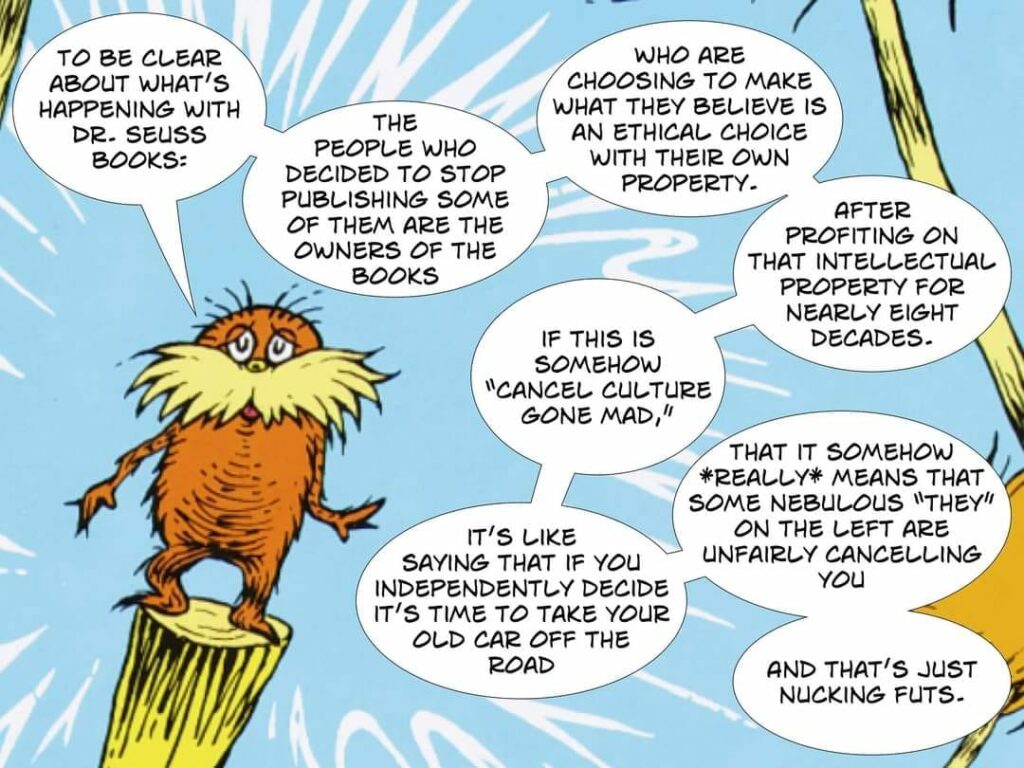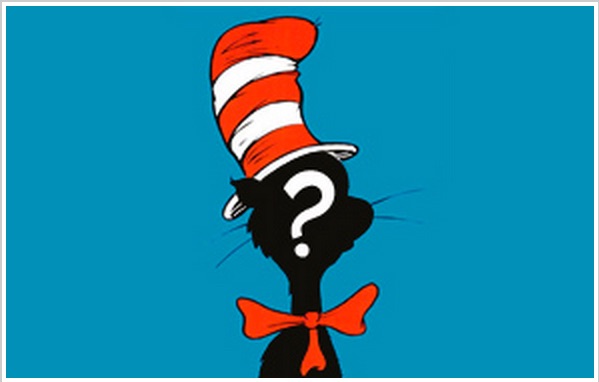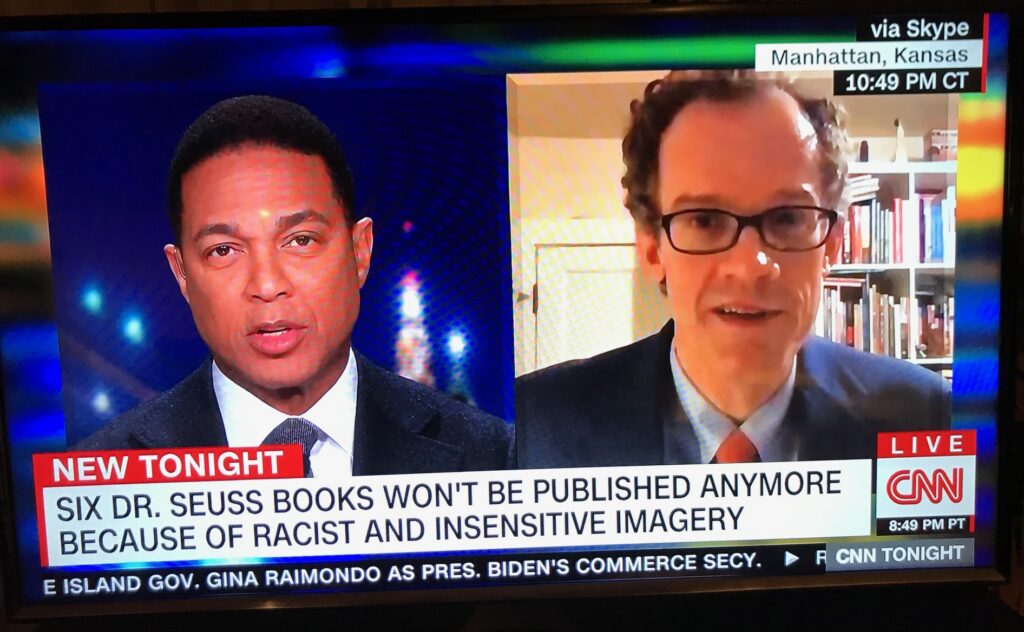
In the wake of last week’s intense focus on Dr. Seuss and racism, I’m gathering (a) some resources for anti-racist children’s literature, and (b) a sampling of the Seuss-and-racism media.
Many people have emailed or messaged me with questions. If I neglected yours, I apologize. I hope these links will give you a place to begin. And I realize there’s a lot here! Don’t feel you need to digest this all at once. Bookmark the page and come back. Indeed, to facilitate your ongoing education, follow these groups on social media – many have a presence on Twitter, Instagram, and/or Facebook.
OK. First, the resources! Next, the Seuss links!
Resources for Anti-Racist Children’s Literature
- American Indians in Children’s Literature, established in 2006. Debbie Reese’s site offers “critical perspectives and analysis of indigenous peoples in children’s and young adult books, the school curriculum, popular culture, and society.”
- Asian/Pacific Americans Librarians Association‘s Talk Story literacy program and Book Reviews.
- Brown Bookshelf, established in 2007: “designed to push awareness of the myriad Black voices writing for young readers.”
- The Conscious Kid: “an education, research, and policy organization dedicated to equity and promoting healthy racial identity development in youth. We support organizations, families, and educators in taking action to disrupt racism in young children.”
- CrazyQuiltEdi‘s Diversity Resources, from Edi Campbell. Check our her recent post on Dr. Seuss Enterprises’ recent product recall.
- #DisruptTexts, “a crowdsourced, grass roots effort by teachers for teachers to challenge the traditional canon in order to create a more inclusive, representative, and equitable language arts curriculum.”
- Healing Fictions: Twitter account offering “Dispatches on children’s & YA lit, media & comics by Penn GSE Assoc Prof Ebony Elizabeth Thomas’ amazing grad student team.”
- Latinxs in KidLit. As it says, “Exploring the world of Latinx YA, MG and children’s literature.”
- Learning for Justice. Founded by the Southern Poverty Law Center as Teaching Tolerance in 1991, the organization changed its name in February 2021. It strives “to center justice and the action that students and educators can take to realize change.”
- Lee & Low Books have many diversity initiatives, including the Diversity Baseline Survey for publishers, its Diversity Gap Studies, and many blog posts on diversity, race, and representation.
- Oyate’s Resources “that teach respect for Native peoples, and help parents and educators to provide their children with historically accurate, culturally appropriate information about Native peoples.” (The website has not been updated recently, but it remains a valuable resource.)
- Reading While White, a group of White librarians pledged to “hold ourselves responsible for understanding how our whiteness impacts our perspectives and our behavior.” They published thoughtful essays and book reviews, and offered useful resources. As they said, “As White people, we have the responsibility to change the balance of White privilege.” Active from 2015 to 2020, the site seems to be on hiatus. But please do see all of the websites on their blogroll.
- Rich in Color: Since 2013, these bloggers have been “reading, reviewing, talking about, and otherwise promoting young adult fiction starring or written by Black, Indigenous, and People of Color (BIPOC)”
- Teaching for Change, founded in 1990, is dedicated to using education to promote social justice. As its website explains, it “provides teachers and parents with the tools to create schools where students learn to read, write and change the world.” The organization offers an anti-bias curriculum, resources for teaching about the U.S. Civil Rights Movement, recommended books, and ways for parents to get involved.
- We Need Diverse Books is Ellen Oh, Malinda Lo, and Aisha Saeed’s “grassroots organization of children’s book lovers that advocates essential changes in the publishing industry to produce and promote literature that reflects and honors the lives of all young people.” It includes resources for writers (including advice, awards, and grants) and readers (on where to find diverse books), and opportunities for you to get involved.
Research on Anti-Racist Children’s Literature
- The Augusta Baker Lectures and Baker Diversity Series from the University of South Carolina’s School of Library and Information Science.
- The Brownies Book (1920-1921), pioneering publication of African American children’s literature – co-edited by W.E.B. DuBois and Jessie Fauset. It’s part of The Tar Baby and the Tomahawk: Race and Ethnic Images in Children’s Literature 1880-1939 (at the University of Nebraska at Lincoln).
- CCBC’s Diversity Statistics. A project (launched in 1985 out of the University of Wisconsin-Madison) tracking diversity in children’s literature. See also the infographic created by Sarah Park Dahlen and David Huyck.
- CPLE’s Reflecting Realities, UK research on diversity in children’s literature (2017-present).
- Research on Diversity In Youth Literature, open-access journal edited by Sarah Park Dahlen and Gabrielle Atwood Halko. Published Katie Ishizuka and Ramón Stevens’ “The Cat Is Out of the Bag: Orientalism, Anti-Blackness, and White Supremacy in Dr. Seuss’s Children’s Books” (2019).
- Researchers Exploring Inclusive Youth Literature, organization founded by Breanna J. McDaniel and Joshua Simpson. Organizes conferences, talks, and education.
Thanks to Sarah Park Dahlen for giving the above lists a read-through and directing me to a few I would otherwise have missed.
Seuss, Race, Racism: General

most recent update of these links: 16 May 2021
- Philip Nel, “Breaking up with your favorite racist childhood classic books,” Washington Post, 16 May 2021. In which I debunk the White-supremacist lie of “cancel culture.”
- Valerie Strauss, “No, a Virginia school district didn’t ban Dr. Seuss books. Here’s what really happened,” Washington Post, 26 Feb. 2021. This reprints my 2017 interview with the Washington Post.
- Philip Nel, The Cat, Seuss, and Race (2 March 2020). In which I reprint a program note I wrote for the Adventure Theatre Company’s 2019 production of The Cat in the Hat.
- Philip Nel, What to Do with Dr. Seuss? (2 March 2018). In which I invite you to think about precisely that.
- Philip Nel, Was the Cat in the Hat Black? (Talks @ Google version) (2017). The first 8 minutes of my Talk @ Google offers a condensed version of the “Dr. Seuss” chapter of Was the Cat in the Hat Black? (2017). If your library subscribes to ProjectMuse, you can access an earlier version (2014) of the title chapter: “Was the Cat in the Hat Black?: Exploring Dr. Seuss’s Racial Imagination,” Children’s Literature vol. 42, pp. 71-98.
- Katie Ishizuka and Ramón Stephens’ “The Cat is Out of the Bag: Orientalism, Anti-Blackness, and White Supremacy in Dr. Seuss’s Children’s Books,” in Research on Diversity in Youth Literature (2019). Ishizuka and Stephens are the duo behind The Conscious Kid. Follow them on Instagram and Twitter!
Seuss, Race, Racism: March 2021
most recent update of these links: 13 Apr. 2021

In terms of media, last week was the most intense I’ve ever experienced. I spoke to about 25 different journalists, from five countries – primarily US and Canada, but also Australia, UK, and Russia. Here are some of the media stories from March 2021, organized by category (TV, radio/podcast, print). In my social media feeds, the Esquire piece has been shared the most. So, if you only have time for one, maybe start there.
TV / video
CBS Evening News with Adriana Diaz
NBC’s The Week with Joshua Johnson
WDIV (Detroit, NBC affiliate)
Wavemaker (Michael Schulder’s video podcast). He also has an essay: “Following the Path of the Cat in the Hat”.
Philip Nel on Dr. Seuss from Michael Schulder on Vimeo.
Radio / podcast
Front Burner (podcast, CBC), featuring me and Michelle Martin.
Dora Mekouar, “Is It Time to Cancel Dr. Seuss Due to Racist Imagery?” Voice of America, 18 Mar. 2021.
(I don’t know if the other radio spots are archived anywhere…)
Rebecca Onion, “How Dr. Seuss Responded to Critics Who Called Out His Racism,” Slate, 3 Mar. 2021. Interview.
Adrienne Westenfeld, “A Dr. Seuss Expert Cuts Through the Noise on the Cancel Culture Controversy,” Esquire, 5 Mar. 2021. Interview.
Vimal Patel, “Race on Campus: ‘Was the Cat in the Hat Black?’ One Scholar’s Look at the Racism of Dr. Seuss,” The Chronicle of Higher Education, 9 Mar. 2021. Interview.
Alexandra Alter and Elizabeth A. Harris, “Dr. Seuss Books Are Pulled, and a ‘Cancel Culture’ Controversy Erupts,” New York Times, 4 Mar. 2021.
Edward Helmore, “‘It’s a moral decision’: Dr Seuss books are being ‘recalled’ not cancelled, expert says,” The Guardian, 7 Mar. 2021.
Taylor Weik, “Why Dr. Seuss got away with anti-Asian racism for so long,” NBC Asian America, 11 Mar. 2021.
Jeet Heer, “Free Dr. Seuss!” The Nation, 7 Apr. 2021.
Julia Barajas, “How teachers in L.A. and beyond turned away from Dr. Seuss,” L.A. Times, 5 Mar. 2021.
Barbara Goldenberg and Dan Fastenberg, “Six Dr. Seuss books pulled from publication due to racist imagery,” Reuters, 2 Mar. 2021.
Marie Szaniszlo, “Six Dr. Seuss books will no longer be published because of racist images,” Boston Herald, 2 Mar. 2021.
Eric Adler, “Meet the Kansas professor who was among the first to reveal racism in Dr. Seuss books,” Kansas City Star, 4 Mar. 2021.
A.J. Dome, “K-State scholar says removal of six Dr. Seuss books from sale is ‘responsible’ decision”, Manhattan Mercury, 5 Mar. 2021.

Mary
Tasha